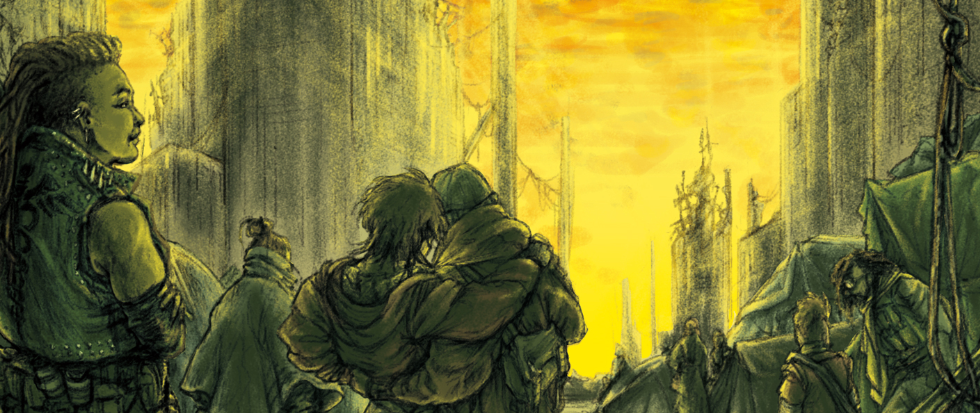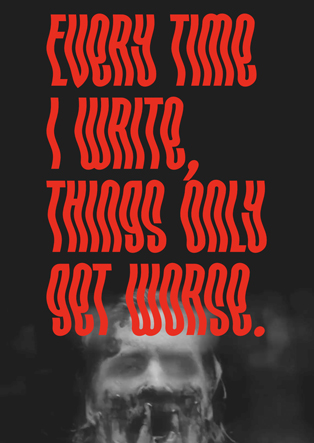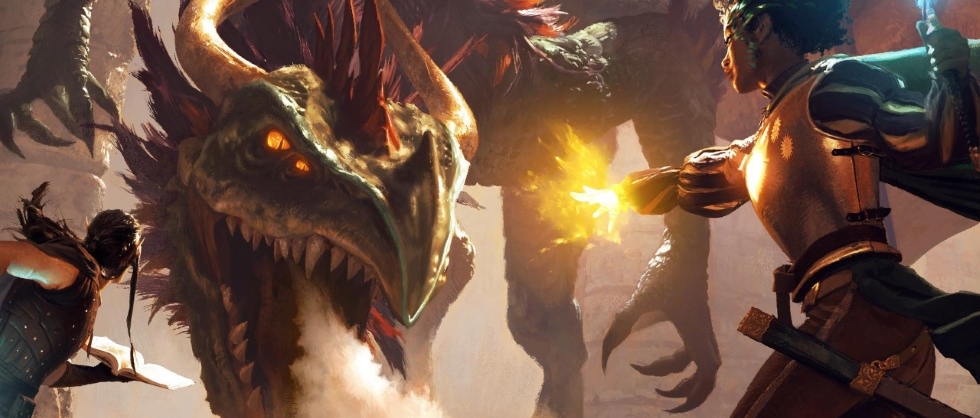
Belonging Outside of Belonging: Avery Alder’s Dream Askew
For Avery Alder, RPGs have always been about belonging and inclusiveness. “I hope that people look to these games for inspiration on how to tell stories about community,” she tells me via email. “I want everyone to do their earnest best to tell diverse, original stories.”
She’s referring to Dream Askew, her new RPG nearing the final days of its Kickstarter campaign. It’s set in a world where civilization has collapsed, but not all at once in a Mad Max, we-nuked-ourselves way. “There was no great cataclysmic event that transformed the world into a carnival of marauders and mutants,” she says. “Instead, the apocalypse comes in waves, slowly eroding the boundaries of a good society.” It’s a world ravaged by destructive industrialization, the result of capitalism run amok.
Alder does not view Dream Askew to be about the collapse of humanity, but of civilization, the silent agreement that we all live peacefully, in concert, as one. Here, in the wasteland and among the ruins society, players take on the role of a survivor seeking shelter and safety in a queer enclave that has banded together in the face of this collapse.
“Dream Askew is set in the chaos of a collapsing society because that’s a world that queer people are always teetering toward,” Alder says. “It’s an apocalypse that’s just around the corner for lots of people in our real world today, and which has already arrived for many others.”
The tagline on Dream Askew’s Kickstarter page is “a game about belonging outside of belonging,” a motto that drives home its focus on the marginalized LGBTQ+ community. “What defines the apocalyptic collapse of Dream Askew is that it happens unevenly over time, as capitalism fails more and more people; that it impacts queer people in a really distinct way, and leads to the creation of queer enclaves.”
It all begins with the community worksheet, Alder tells me. This worksheet is a guided process to creating the players’ enclave, what it looks like, and how it works. “That sheet involves defining a tripartite conflict at the heart of the community, and a conversation about how that conflict impacts and divides people,” says Alder.
And then the players are dropped into the eye of it all. It’s up to them to decide the impact they’ll have on the community going forward. There are several classes (the Torch, the Hawker, etc.), each with their own abilities called “moves.” There are no dice in Dream Askew. Instead, there is a give-and-take token system at play. Mechanically, weak moves like “ostracize one of your followers” or “appeal to prophecy or cosmic forces” grant a token, while strong moves like “get out of harm’s way” or incite your followers to violent action” require a token. This provides a balanced play experience and helps to emphasize your impact on the community.
“So, let’s say you’ve created a community struggling to reconcile its wild party culture with the need for healing, stability, and trauma work,” Alder explains. “How will your scarcity-minded Hawker with their grow-op and gun distro contribute to that tension? What about the psychically-unhinged Iris with a heart of gold? Each character holds power that has the potential to put them at odds with the rest of their community, but also to make meaningful change within it.”
I asked Alder about how queerness has historically been represented in RPGs, and how she hopes Dream Askew will differentiate itself in that regard. Her answer was surprisingly optimistic: “I think a number of mainstream roleplaying games are doing really important work to broaden who they portray as heroes, and to make space for everyone in their stories. I’m hopeful that it’s only the beginning!”
But Alder stresses that representation isn’t the only consideration RPGs need to make regarding the queer community. She says focusing on stories from the bottom up is the only way to enact meaningful change. “We need to look critically at the structures we use to tell stories, and ask ourselves what politics are embedded within those structures. Are we telling stories that are violent, colonial, and individualistic at their core? If that’s the case, representation can only take us part of the way toward creating an inclusive, liberatory sort of hobby.” She also says that designers need to start looking at incorporating new elements into their games. Elements like “navigating difference, building community, solving problems, and finding our place in the world.”
If these thoughts sound like those of a veteran of game design, you’d be right: Askew not Alder’s first go at RPG design. Her past projects include Monsterhearts, Ribbon Drive, and The Quiet Year. She has also given numerous talks on inclusiveness in game design, most recently at Fastaval, a gaming convention in Denmark.
Her expertise has attracted the attention of many notable storytellers, including author Benjamin Rosenbaum who was inspired in part by Dream Askew to create an RPG using the same mechanics and post-apocalyptic setting, but is instead set in a Jewish shtetl in a “fantastical-historical Eastern Europe.” Alder and Rosenbaum began to work together in 2014 and, according to their Kickstarter page, “In early 2017, they made the decision to continue developing their games in close dialogue, and eventually release them together in a single volume.”
Rosembaum’s game, Dream Apart, is equally ambitious, and is something I will write about in the near future. In the meantime, take a look at the pair’s Kickstarter and consider funding their impressive collaboration.
For Alder, Dream Askew is the product of years of hard work and iteration. As her vision finally nears release, she hopes that she can inspire marginalized communities to tell their stories in their own unique ways. “I don’t want to advocate for a prescriptive template for how to represent LGBT+ people in games,” she says. “I hope that people look to these games for inspiration on how to tell stories about community.”





